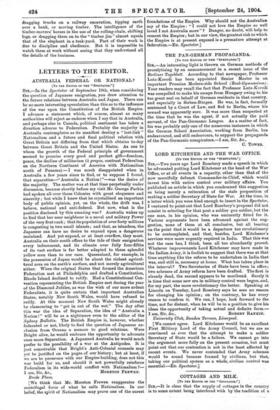[TO THE EDITOR OP THE - spEorATon.".1 SIR,—Two years ago Lord
Rosebery made a speech in which be advocated putting Lord Kitchener at the head of the War Office, or at all events in a capacity, other than that of tho now mercifully defunct Commander-in-Chief, which would invest him with entire control over military affairs. You published an article in which you condemned this suggestion as being merely a reiteration of the stale proposition of making a soldier Secretary of State for War. At the time, in a letter which you were kind enough to insert in the Spectator, I ventured to point out that Lord Rosebery's proposal did not consist in selecting for that post a soldier qua soldier, but the one man, in his opinion, who was eminently fitted for it. Various arguments have been advanced against the sug- gestion, none of them at all conclusive, but all bearing on the point that it would be a departure too revolutionary to be contemplated, and that, besides, Lord Kitchener's services were more urgently required in India. That this was not the case has, I think, been all too abundantly proved. Whatever improvements Lord Kitchener may have made in the Indian Army, it is foolish to suggest that there was at that time anything like the reform to be undertaken in India that was, and still is, necessary at home. What has taken place in the interval ? Two Secretaries of State have been in office; two schemes of Army reform have been drafted. The first is already dead, the second appears to be moribund. Surely it is time that some new era in military control were begun, and, for my part, the more revolutionary the better. Speaking at Lincoln on Tuesday, Lord Rosebery says he sees no reason for changing his opinion; on the contrary, he has every reason to confirm it. We can, I hope, look forward to the time, not far distant, when he will be in a position to give- his ideas the opportunity of taking actual and definite form.— I am, Sir, &c., ROBERT RANKIN. University Club, Sandon Terrace, Liverpool.
[We cannot agree. Lord Kitchener would be an excellent First Military Lord of the Army Council, but we are as convinced as ever that the attempt to make a soldier Secretary of State would be a failure. We cannot go into the argument more fully on the present occasion, but must point out that our contention is not in the least affected by recent events. We never contended that Army schemes would be sound because framed by civilians, but that, taking our political system as a whole, civilian control was essential.—En. Spectator.]
COTTAGES AND MILK.






































 Previous page
Previous page